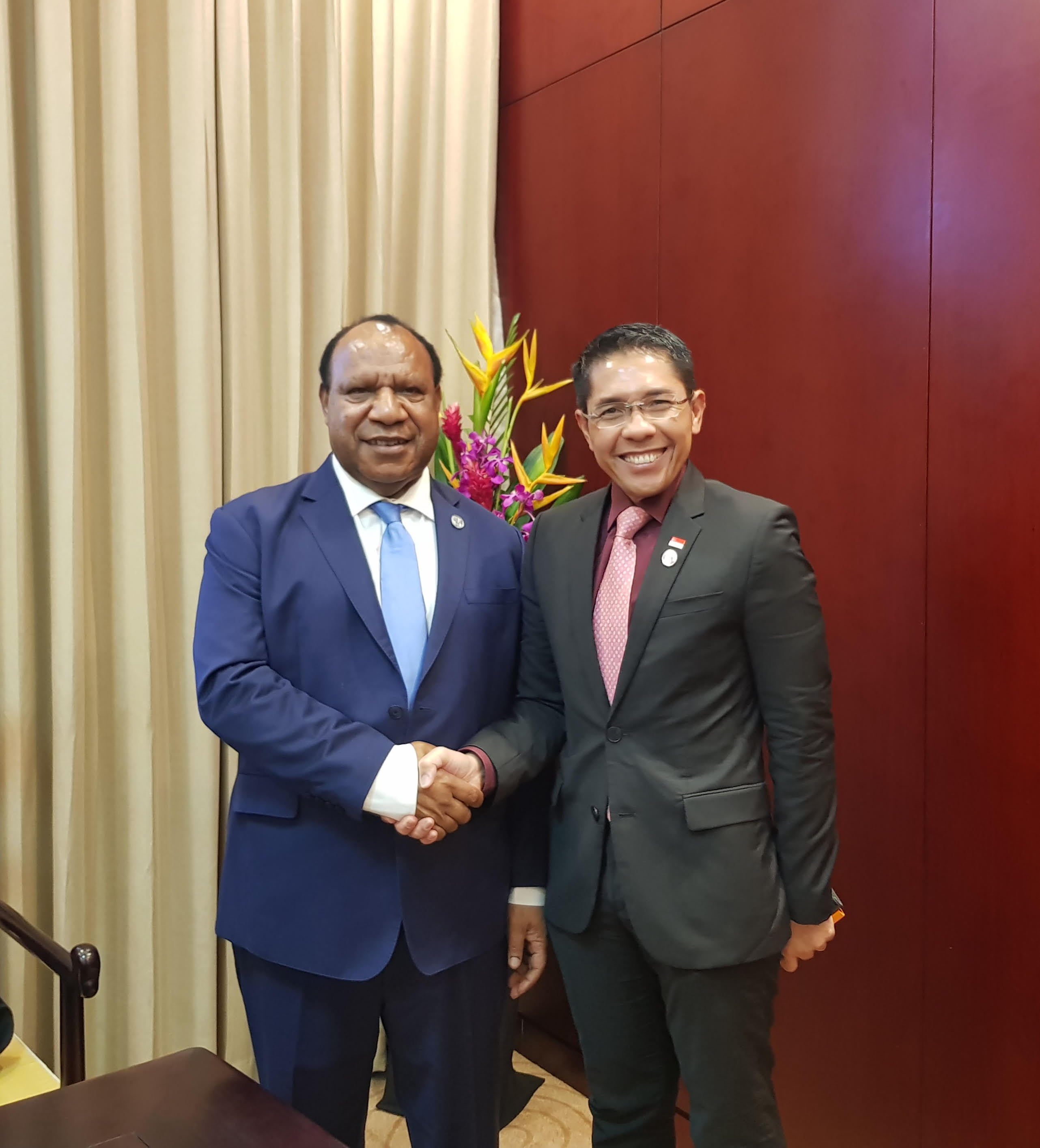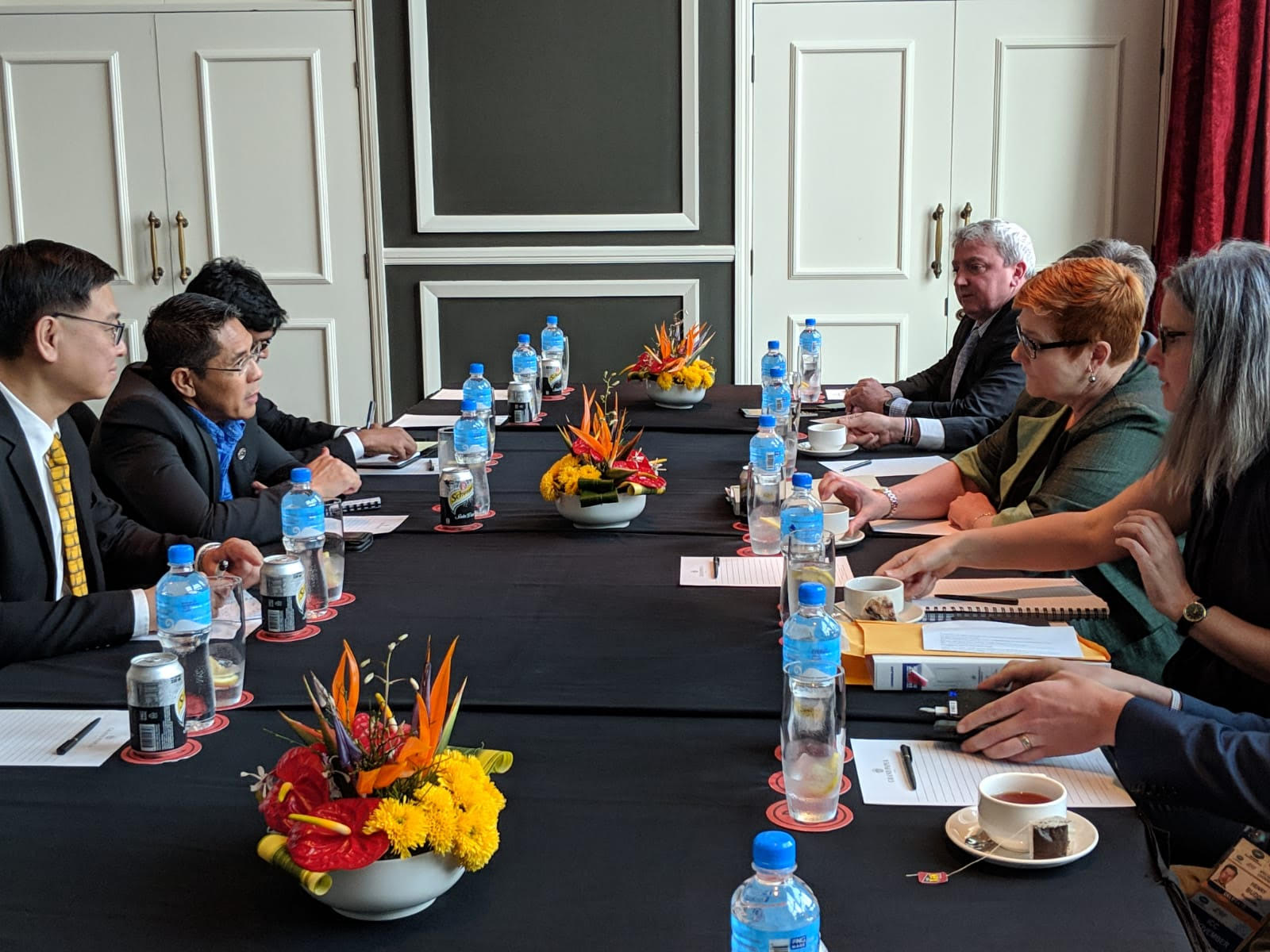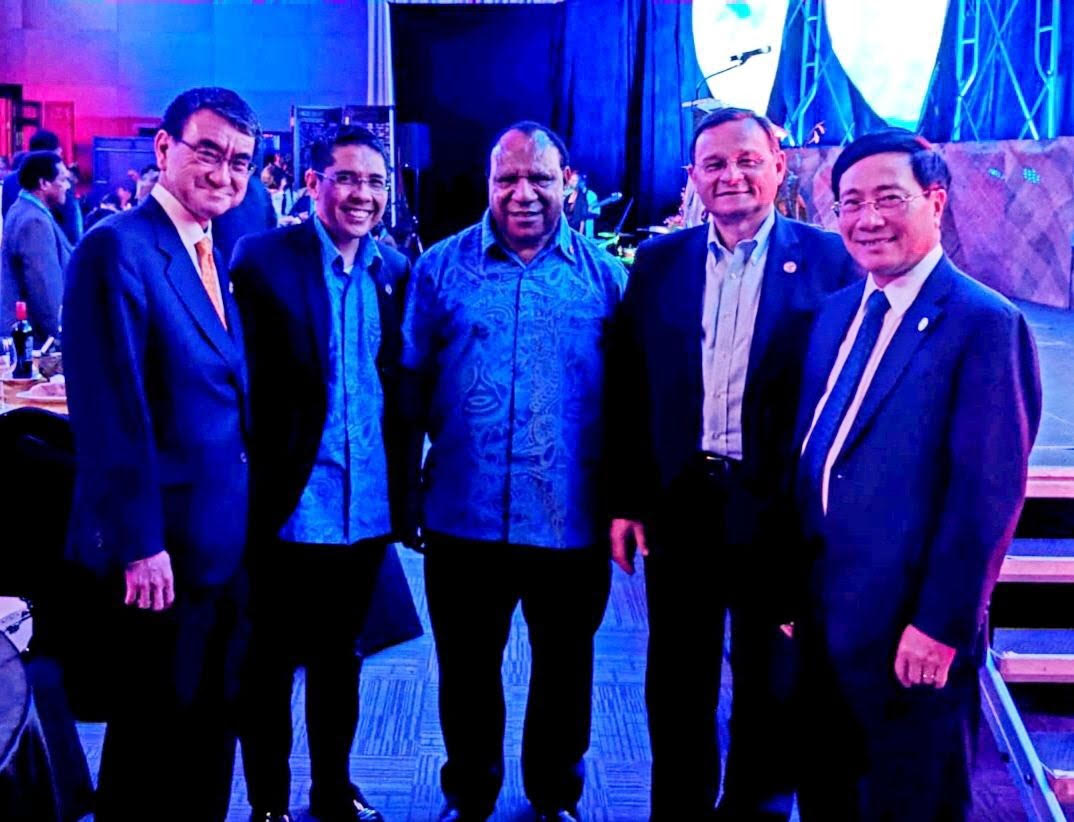Senior Minister of State (SMS), Ministry of Defence and Ministry of Foreign Affairs, Dr Mohamad Maliki Bin Osman attended the 30th Asia Pacific Economic Cooperation (APEC) Ministerial Meeting (AMM) in Port Moresby, Papua New Guinea from 13 to 16 November 2018.
At the AMM, SMS Maliki delivered interventions on enhancing regional economic integration, and on promoting inclusive and sustainable growth. In particular, SMS Maliki spoke on the importance of upholding the open and rules-based multilateral trading system so that our people can continue to benefit from economic globalisation. SMS Maliki also shared ways to improve our public healthcare systems and to strengthen global and regional health cooperation, in order to reduce the impact of health-related threats to growth across APEC.
SMS Maliki met with Australia’s Minister for Foreign Affairs Marise Payne and Papua New Guinea’s Minister for Foreign Affairs and Trade Rimbink Pato on the sidelines of the AMM. They reaffirmed the warm bilateral ties that Singapore has with Australia and Papua New Guinea respectively.
SMS Maliki also met with youth delegates from Singapore who were participating in the APEC Voices of the Future programme. This annual programme brings together young people across APEC economies to discuss ways to contribute to the region’s development with APEC Leaders, officials and CEOs.

At the 30thAPEC Ministerial Meeting on 15 November 2018, SMS spoke on enhancing regional economic integration, and on ways to promote inclusive and sustainable growth. (Credit: MFA)

SMS had a bilateral meeting with the host of the APEC Ministerial Meeting Papua New Guinea Minister for Foreign Affairs and Trade Rimbink Pato on 14 November 2018. (Credit: MFA)

SMS met Australia Minister for Foreign Affairs Marise Payne on 15 November 2018. (Credit: MFA)

At the Gala dinner hosted by Papua New Guinea Minister for Foreign Affairs and Trade Rimbink Pato, SMS met Japan Minister for Foreign Affairs Taro Kono, Vietnam Deputy Prime Minister and Minister for Foreign Affairs Pham Binh Minh, and Peru Minister of Foreign Affairs Néstor Popolizio. (Credit: MFA)
. . . . .
MINISTRY OF FOREIGN AFFAIRS
SINGAPORE
16 NOVEMBER 2018
INTERVENTION BY SENIOR MINISTER OF STATE (FOREIGN AFFAIRS) (DEFENCE) DR MALIKI OSMAN AT THE 30TH APEC MINISTERIAL MEETING (PLENARY SESSION 1) ON 15 NOVEMBER 2018 AT THE INTERNATIONAL CONVENTION CENTRE IN PORT MORESBY, PAPUA NEW GUINEA
Mr Chairman, first, allow me to congratulate Papua New Guinea for successfully organising the APEC Economic Leaders’ Week, a landmark event for PNG. I would also like to thank the government of PNG for the warm hospitality extended to my delegation and me.
Let me put on record our gratitude to Dr Alan Bollard for his six years of distinguished service as the APEC Secretariat’s Executive Director. Under his able leadership, the Secretariat has provided valuable support to successive APEC Chairs, and greatly advanced APEC’s work.
I congratulate Tan Sri Datuk Dr Rebecca Fatima Sta Maria on her appointment as the new Executive Director. Rebecca is familiar to many of us in the region from her time as the Secretary-General of Malaysia’s Ministry of International Trade and Industry. We wish Rebecca every success, and welcome her to Singapore.
Mr Chairman, we appreciate WTO Deputy Director-General Yi’s timely briefing on the global trade and economic climate. Singapore firmly supports the open, rules-based multilateral trading system which has underpinned the Asia-Pacific region’s stability and prosperity for decades. However, uncertainty over the benefits of free and open trade have led to growing sentiments against globalisation. It is important to ensure that our people continue to benefit from economic globalisation. We can achieve this by maintaining the momentum of regional cooperation and adopting the right policies to mitigate the negative impacts.
APEC has a critical role to play in supporting and contributing to the multilateral trading system. APEC economies must stay the course to achieve our 2020 Bogor Goals of free and open trade and investment in the Asia-Pacific region. Post-2020, APEC must develop ambitious, strategic and yet practical goals. To this end, we welcome the work being done by the APEC Vision Group, and look forward to its report next year. Our new vision should incorporate the Free Trade Area of the Asia Pacific, which our Leaders have supported since 2006. We are very glad that the complementary pathways to FTAAP are being built. These include the Comprehensive and Progressive Agreement for Trans-Pacific Partnership which will enter into force this December, Regional Comprehensive Economic Partnership and Pacific Alliance.
Our growth strategies must ensure that all segments of our communities can benefit. Efforts to enhance SMEs’ participation in global trade, and equipping our workers with the right skills to tap into the digital economy of today are ever more important.
Thank you.
. . . . .
INTERVENTION BY SENIOR MINISTER OF STATE (FOREIGN AFFAIRS) (DEFENCE) DR MALIKI OSMAN AT THE 30TH APEC MINISTERIAL MEETING (PLENARY SESSION 2) ON 15 NOVEMBER 2018 AT THE INTERNATIONAL CONVENTION CENTRE IN PORT MORESBY, PAPUA NEW GUINEA
Mr Chairman, public health threats and pandemics in particular can severely affect economic growth. When Severe Acute Respiratory Syndrome, or SARS, struck Singapore in early 2003, our GDP growth in Q2 2003 contracted sharply by 7%. Given Singapore’s experience with SARS, we welcome APEC’s work in supporting APEC member economies to address the impact of today’s health-related issues and public health threats. We work closely with APEC member economies and other bodies such as the WHO and ASEAN to strengthen health security and capabilities in the region. This includes hosting training activities and conferences, sharing best practices and contributing technical experts.
Singapore recognises the importance of strengthening global and regional health cooperation against public health threats. Early warning and information sharing on outbreaks of epidemics and pandemics, such as SARS, Avian Influenza, Ebola, Tuberculosis and Malaria are necessary to ensure that such threats are quickly identified and contained before they can cross borders, so that our economies and trade are better protected.
Within our borders, having a strong, responsive and resilient public healthcare infrastructure is necessary to prevent, detect and respond to threats more effectively and promptly. One of our recent key initiatives has been to establish a National Centre for Infectious Diseases, a state-of-the-art facility for clinical care, surveillance, training and research in infectious diseases.
We are also committed to continually improve and adapt our public health responses. In April this year, we underwent the WHO Joint External Evaluation to further strengthen our capacity and capability to manage major public health threats and emergencies, and to identify areas where we can improve on.
However, public health issues are not limited to infectious threats like SARS. Non-communicable diseases like diabetes also impose heavy economic costs on society and our workforce. To combat this silent threat, we declared a “War on Diabetes” in 2016 to mobilise our population to fight this disease. We have run campaigns to encourage our people to live healthily, through exercise and making better food choices. We also have programmes to encourage young adults to assess their risk of undiagnosed diabetes and undergo subsidised screening. On a broader level, we have also started a programme called “Screen for Life” to detect chronic diseases early by encouraging our population to go for regular screenings and post-screening consultations with their physicians at a very low-cost. To-date, about 60,000 people have benefitted from this programme. These initiatives reflect our strong belief that prevention is better than cure when it comes to public health issues.
Mr Chairman, I commend APEC’s efforts in addressing health-related threats and reiterate our support for APEC’s work in improving public healthcare systems across the region. It is essential to promoting sustainable and inclusive growth for all in the region. Thank you.
. . . . .